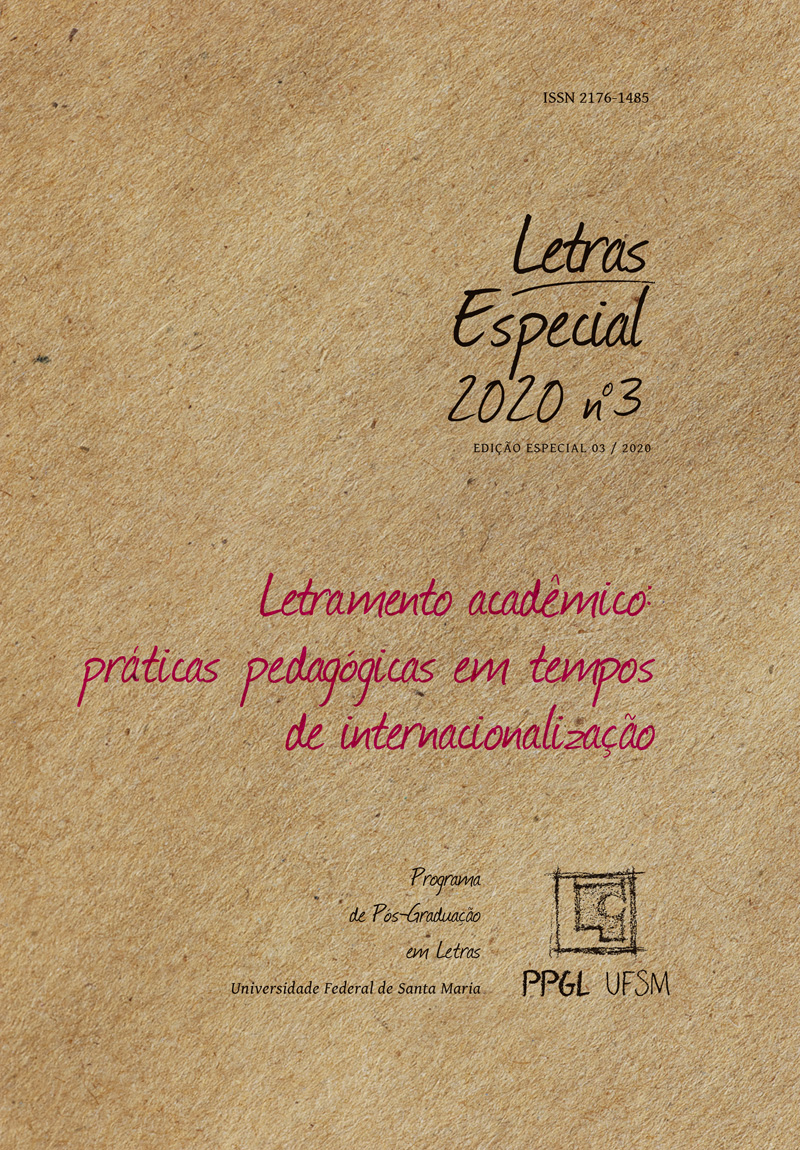PRESENT SITUATION ANALYSIS WITHIN CRITICAL-COMPLEX PEDAGOGY: SURFING THE TEXT, THE CONTEXT AND THE DISCOURSE
DOI:
https://doi.org/10.5902/2176148543333Parole chiave:
Critical-complex pedagogy, Critical needs analysis, Present situation analysis, Academic Literacy.Abstract
This paper discusses the improvements that critical-complex pedagogy proposes to present situation analysis – a fundamental pre-course investigation of students’ communicative and learning needs and wants in English for Specific Purposes literature. The pedagogy expands students’ communicative needs analysis beyond rhetorical and linguistic conventions of the target discourse. A three-phase investigation for the design of an online Critical English for Academic Purposes course is presented and demonstrates the potentialities of the pedagogy to orient the investigation of students’ pre-course knowledge about textual, contextual and discursive features of the target genres, in order to identify their literacy skills to produce those genres.Downloads
Riferimenti bibliografici
AAKER, David A.; DAY, George S. Marketing Research. 4. ed. Singapura: John Wiley & Sons, 1990.
ARANHA, Solange. The development of a genre-based writing course for graduate students in two fields. In: BAZERMAN, Charles; BONINI, Adair; FIGUEIREDO, Débora. (org.). Genre in a changing world. X ed. Santa Barbara, CA: The WAC Clearinghouse and Parlor Press, 2009. p. 465-48.
ATAI, Mahmood Reza; SHOJA, Leila. A Triangulated Study of Academic Language Needs of Iranian Students of Computer Engineering: Are the Courses on Track? In: RELC Journal, v. 42, n. 3, p. 305-323, 2011.
BAKIĆ-MIRIĆ, Nataša. Significance of creating a custom diagnostic English language test in English for specific purposes course at the University of Niš Medical school. Acta medica Medianae, Niš, Serbia, v. 51, n. 1, p. 31-36, 2012.
BAWARSHI, Anis S.; REIFF, Mary Jo. Gênero: história, teoria, pesquisa, ensino. São Paulo: Parábola Editorial, 2013.
BAZERMAN, Charles. Speech acts, genres, and activity systems: how texts organize activity and people. In: ______.; PRIOR, Paul A. (Ed.). What writing does and how it does it: an introduction to analyzing texts and textual practices. New Jersey: Lawrence Erlbaum Associates, 2004. p. 309-339.
BENESCH, Sarah. Critical English for Academic Purposes. The Encyclopedia of Applied Linguistics. 2012.
CHENG, An. Analyzing genre exemplars in preparation for writing: The case of an L2 graduate student in the ESP genre-based instructional framework of academic literacy. Applied linguistics, Oxford, vol. 29, no. 1, p. 50-71, 2008.
DE OLIVEIRA, Gisele. Um Ponto de Partida na Trajetória do Entendimento das Necessidades de Alunos do Curso de Sistemas de Informação em Relação ao Uso do Inglês. The ESPecialist, São Paulo, v. 32, n. 1, p. 49-68, 2011.
FERREIRA, Marília Mendes. A promoção do letramento acadêmico em inglês por meio do ensino desenvolvimental: contribuições da teoria histórico-cultural. 179f. Tese de Livre-Docência, Faculdade de Filosofia, Letras e Ciências Humanas, Universidade de São Paulo, São Paulo, 2015.
FLOWERDEW, John; PEACOCK, Matthew. Issues in EAP: A preliminary perspective. In: ______. Research perspectives on English for academic purposes. Cambridge: Cambridge University Press, 2001, p. 8-24.
FREIRE, Maximina M. Complex Educational Design: a course design model based on the complexity theory. International Conference on Information Communication Technologies in Education, Rhodes, Greece: University of the Aegean, v. 1, p. 35-48, 2012.
GILAKJANI, Abbas Pourhossein. Visual, auditory, kinaesthetic learning styles and their impacts on English language teaching. Journal of Studies in Education, v. 2, n. 1, p. 104-113, 2011.
GUILFORD, William H. Teaching peer review and the process of scientific writing. Advances in physiology education, v. 25, n. 3, p. 167-175, 2001.
HYLAND, Ken. Genre and second language writing. Michigan, EUA: The University of Michigan Press, 2004.
______.. English for specific purposes: some influences and impact. In: CUMMINS, Jim; DAVIDSON, Chris (Ed.). International handbook of English language teaching. Boston: Springer, 2005, p. 391-402.
KAVALIAUSKIENÉ, Galina; UŽPALIENĖ, Daiva. Ongoing Needs Analysis as a Factor to Successful Language Learning. Journal of Language and Learning, United Kingdom, vol. 1, no. 1, p. 35-50, 2003.
MOTTA-ROTH, Desiree; HENDGES, Graciela Habuske. Produção Textual na Universidade. São Paulo: Parábola Editorial, 2010.
RAMOS, Rosinda Castro Guerra; LIMA-LOPES, Rodrigo Esteves de; GAZOTTI-VALLIM, Maria Aparecida. Análise de necessidades: Identificando gêneros acadêmicos em um curso de leitura instrumental. The ESPecialist, São Paulo, v. 25, n. 1, p. 1-29, 2004.
SARMENTO, Maria Edileuda do Rego. Análise de necessidades de inglês para fins específicos em um curso de graduação em turismo. 124f. Dissertação (Mestrado em Letras). Programa de Pós-graduação em Estudos da Linguagem, Universidade Federal do Rio Grande do Norte, 2012.
SHING, Soo Ruey; SIM, Tam Shu. EAP Needs Analysis in Higher Education: Significance and Future Direction. English for Specific Purposes World, Kuala Lumpur, Malaysia, vol. 11, p. 1-11, 2011.
SONGHORI, Mehdi Haseli. Introduction to needs analysis. English for Specific Purposes World, Kuala Lumpur, Malaysia, v.7, n. 4, p. 1-25, 2008.
SWALES, John M. Genre Analysis: English in academic and research settings. Cambridge: Cambridge University Press, 1990.
______. Sobre modelos de análise do discurso. In: BIASI-RODRIGUES, Bernardete; ARAÚJO, Júlio César.; SOUSA, Socorro Cláudia Tavares (org.) Gêneros textuais e comunidades discursivas: um diálogo com John Swales. Belo Horizonte: Autêntica, 2009, p. 33-47.
TERRA. Website. Investimento da educação pública. 2012. Available at http://noticias.terra.com.br/educacao/infograficos/gasto-publico-educacao/ Accessed on Oct. 30, 2018.
XXX, 2014.
______., 2015a.
______., 2015b.
______., 2017.
______., 2018.
______., 2019a.
______., 2019b.
______., (in progress).
WONG, Lillian L. C; NUNAN, David. The learning styles and strategies of effective language learners. System, v. 39, n. 2, p. 144-163, p. 2011.
##submission.downloads##
Pubblicato
Versioni
- 2022-07-26 (4)
- 2022-07-25 (3)
- 2022-07-04 (2)
- 2021-10-19 (1)
Come citare
Fascicolo
Sezione
Licenza
Copyright (c) 2021 Letras

Questo lavoro è fornito con la licenza Creative Commons Attribuzione - Non commerciale - Condividi allo stesso modo 4.0 Internazionale.
Ficam concedidos a Letras todos os direitos autorais referentes aos trabalhos publicados. Os originais não devem ter sido publicados ou submetidos simultaneamente a outro periódico e não serão devolvidos. Em virtude de aparecerem nesta revista de acesso público, os artigos são de uso gratuito, com atribuições próprias, em aplicações educacionais e não comerciais.






